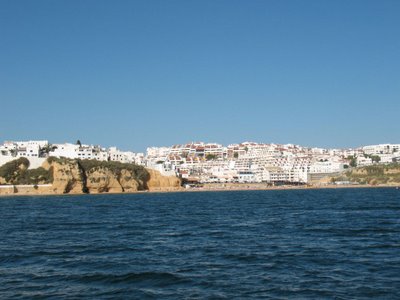Algarve Accessibility Projects Move Slowly
Share on social media
Projects to improve the accessibility of the Algarve for visitors and residents with restricted mobility continue to be put in place – but the changes being made to make the region accessible for all are not being put in place fast enough according to industry experts.
 Photo. Albufeira by G. Brad
Photo. Albufeira by G. Brad
Projects to improve the accessibility of the Algarve for visitors and residents with restricted mobility continue to be put in place – but the changes being made to make the region accessible for all are not being put in place fast enough according to industry experts.
Already schemes such as the accessible route around Portimão (see the Algarve Resident edition October 15, 2010) and the accessibility awards for more than 40 beaches in the Algarve have shown that steps are being taken to improve accessibility here, but to be able to fully capitalise on the potential of accessible tourism more needs to be done.
Ana Garcia, the director of Accessible Portugal, a tourism company set up to offer trips to Portugal for people with reduced mobility and a member of the European Network for Accessible Tourism, said:
“There is no doubt that Portugal, and especially the Algarve, has improved its accessibility for people in recent years. However, there is still a lot to do.
“We are able to find good hotels and villas that have been adapted for wheelchair users but more needs to be done.”
The value of improving services does not just benefit visitors with reduced mobility.
It is also a positive factor for economic growth in the tourism sector.
“I have no doubt in my mind that if there were more accessible venues and accommodation choices then tourism in the region would increase but, to do this, it is fundamental to implement a strategic regional programme to promote the added value of an accessible tourism destination,” said Ana Garcia.
“It is also important to implement training programmes while also opening the minds of people to the economic impact of accessible tourism.”
The stereotypical image of a person in a wheelchair is not the only aspect of accessible tourism; proper parking, pavements and access to beaches, hotels and attractions also affects people who have pushchairs as well as the elderly. And with families and retirees being instrumental to the Algarve economy, changes to make it a lot easier for these groups are essential.
Currently the Portuguese Tourism Board is preparing manuals on the subject of accessible tourism but there is no law in Portugal, or in any other country, specifically about what should be provided as part of this, so the standards that need to be met have not been officially set.
Rachel Shepherd, who runs the www.somewherespecial.org.uk website, which gives details about accessible holidays and amenities in the Algarve, agrees that although improvements have been made, more can still be done in the region.
“I think more modern hotels are improving as is people’s way of thinking but I don’t think the improvements are happening quickly enough,” she said.
“Many restaurants and cafes are still very inaccessible to people in wheelchairs or with reduced mobility and if they do have access, it is often let down by inconsiderate parking from others where ramps are blocked or cars are parked on the pavement.”
She added that sometimes improvements to aid accessibility were also not appropriate: “Badly designed disabled toilets mean that people can still not access them and this makes it very difficult for people to be able to feel comfortable when they go out.
“I have also seen some restaurants that have had to put in ramps but the ramp is at such a gradient and so narrow that it would be impossible for carers/family members to be able to push a wheelchair up the ramp.”
The importance of creating an accessible environment in the Algarve is seen as huge by Rachel Shepherd: “I hope the Algarve realises that more visitors would be attracted to the region if it was made more accessible and the region has the potential to become a leading destination for those suffering from illness or with a disability.
“Many people want to be able to get away for the winter for the warmer weather and with Portugal being such a short flight time, it is a perfect place to travel to. By investing more money into improving the infrastructure then we could have a holiday destination that really is for everyone.”

